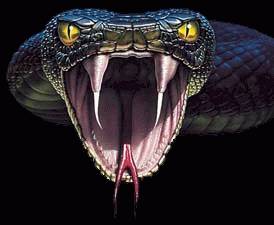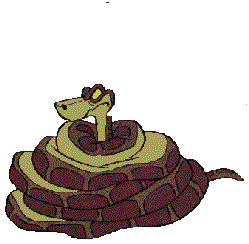 ANACONDA
ANACONDA
|
Anaconda snakes
are the largest constrictor reptiles found in the
Americas. These surreptitious, strong, sleek animals kill their prey by
squeezing them to death along swampy rivers of the Amazon and Orinoco Basins.
Although it is rare, Eunectes murinus are wide and
strong enough to swallow a person whole.
The camouflage coloring and patient demeanor help anaconda snakes to hunt. Smaller varieties have yellow skin while larger ones are more of a bright green. All types of water boas have rounded splotches that resemble the shadows of leaves or a leopard's spots. Most animals are in danger of being captured, including tree birds, waterfowl, turtles, frogs, fish, caiman, rodents, and even small deer. As a constrictor, anaconda snakes are not poisonous. The smooth shape of their head, as opposed to the diamond shape of heads of poisonous snakes like the rattlesnake, differentiates them from their poisonous cousins. However, almost all snakes have teeth. The anaconda will bite its prey close to the riverbank and drag it underneath the water to drown. Away from water, it will use its strong coils to wrap around their victim and squeeze tightly enough to suffocate them. Like most snakes, anacondas can swallow a creature much, much larger than itself by dislocating its own jaw and stretching its neck. After a hefty meal, it may not eat again for weeks. Another adaptation of this unique snake is that its nostrils lay on top of its nose, rather than alongside it, so it can swim and breathe at the same time. |
![]() Copyright(C) 2007
- 2020. All rights reserved.
Copyright(C) 2007
- 2020. All rights reserved.

ANACONDA IV